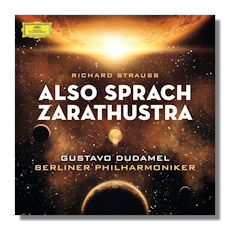
The Internet's Premier Classical Music Source
Related Links
- Strauss Reviews
- Latest Reviews
- More Reviews
-
By Composer
-
Collections
DVD & Blu-ray
Books
Concert Reviews
Articles/Interviews
Software
Audio
Search Amazon
Recommended Links
Site News
 CD Review
CD Review
Richard Strauss

Tone Poems
- Also Sprach Zarathustra, Op. 30
- Don Juan, Op. 20
- Till Eulenspiegel's Merry Pranks, Op. 28
Berlin Philharmonic Orchestra/Gustavo Dudamel
Deutsche Grammophon 4791041
Massively underwhelming, and misleading too. Gustavo Dudamel has been billed as the "next big thing" in classical music for so long that nobody seems to be asking when he'll actually be one. He's personable, media-savvy, and still young and excitable enough to stand out in today's industry. Now that he's recording with Karajan's orchestra, DG is clearly looking to tie in the old and the new. Too bad the old is so much better.
Tying this release to Herbert von Karajan seems silly for so many reasons. In today's scholarly world, Karajan's big and homogenous sound seems a thing of the past for many listeners. Secondly, both Simon Rattle and Claudio Abbado purged the ranks of Karajan's players, for better or worse, and now there is little to musically link the two. Thirdly, and most importantly, Karajan was a much better Strauss conductor than Dudamel is. Indeed, he recorded these works for both Decca and DG (the latter multiple times), and I know there is also some Strauss on EMI that shows the conductor at his very best. Not only is Karajan a more exciting and idiomatic Strauss conductor on all counts, but he also had the advantage of superior players. I even like the sound quality better; the early DG efforts capture the Berlin Philharmonic in glorious form.
Dudamel never really stood a chance. His Don Juan is slowish and lumpy sounding, and comparison to Karajan shows the latter to have fuller strings, and even stronger winds and brass. His Also Sprach Zarathustra is notable for being dull and disinteresting, with the opening having little impact. The strings aren't especially well captured; it's almost as if the producers wanted a "Karajan" sound, and picked his weirdly unbalanced late efforts as reference. The faster parts of the piece don't sound good and have almost no tension. This is a tone poem that already suffers the risk of losing steam as it goes, but if you don't have any steam to start with, you're in trouble. The finale is a non-happening. Eulenspiegel is just kind of there; yes, there are some lovely sounds, and the Philharmonic plays reasonably well through this program, but when Karajan is clearly having more fun with something than you are…are you really having any fun?
To add a final insult to injury, both on DG Originals (447440-2) and Decca Legends (466388-2) was the inclusion of The Dance of the Seven Veils from Salome, the latter with the Vienna Philharmonic. Both of those feature this exact program, and cost less, although the Decca production may need to be purchased from a classical reissue program. No matter, in any case you can have Karajan himself in superior efforts, in a less expensive form, with more music to boot. This disc insults the consumer, with the tacky packaging just another gripe. Not worth it.
Copyright © 2013, Brian Wigman





















